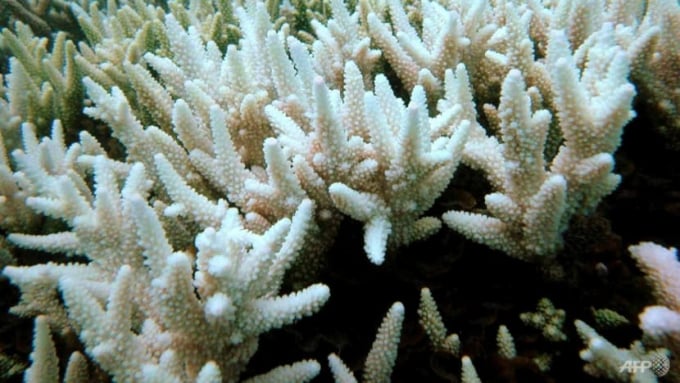June 14, 2025 | 19:41 GMT +7
June 14, 2025 | 19:41 GMT +7
Hotline: 0913.378.918
June 14, 2025 | 19:41 GMT +7
Hotline: 0913.378.918

A single so-called bleaching event in 1998 caused by warming waters wiped out 8 per cent of all corals. Photo: AFP
Dynamite fishing and pollution - but mostly global warming - wiped out 14 per cent of the world's coral reefs from 2009 to 2018, leaving graveyards of bleached skeletons where vibrant ecosystems once thrived, according to the largest ever survey of coral health.
Hardest hit were corals in South Asia and the Pacific, around the Arabian Peninsula, and off the coast of Australia, more than 300 scientists in the Global Coral Reef Monitoring Network reported.
"Climate change is the biggest threat to the world's reefs," co-author Paul Hardisty, CEO of the Australian Institute of Marine Science, said in a statement.
Oceans absorb more than 90 per cent of the excess heat from greenhouse gas emissions, shielding land surfaces but generating huge, long-lasting marine heatwaves that are pushing many species of corals past their limits of tolerance.
A single so-called bleaching event in 1998 caused by warming waters wiped out 8 per cent of all corals.
Coral reefs cover only a tiny fraction - 0.2 per cent - of the ocean floor, but they are home to at least a quarter of all marine animals and plants.
Besides anchoring marine ecosystems, they also provide protein, jobs and protection from storms and shoreline erosion for hundreds of millions of people worldwide.
The value of goods and services from coral reefs is about US$2.7 trillion per year, including $36 billion in tourism, the report said.
Loss of coral from 2009 to 2018 varied by region, ranging from 5 per cent in East Asia to 95 per cent in the eastern tropical Pacific.
THE CORAL TRIANGLE
"Since 2009 we have lost more coral worldwide than all the living coral in Australia," noted UNEP executive director Inger Anderson.
"We can reverse the losses, but we have to act now."
The UN's climate science advisory panel, the IPCC, projects with "high confidence" that global warming of 1.5 degrees Celsius above preindustrial levels will see 70 to 90 per cent of all corals disappear.
In a 2 degrees Celsius warmer world, less than 1 per cent of global corals would survive.
Earth's average surface temperature has already increased by 1.1 degrees Celsius above that benchmark.
The report, titled Status of Coral Reefs of the World: 2020, found reasons for cautious optimism.
"Some reefs have shown a remarkable ability to bounce back, which offers some hope for the future recovery of degraded reefs," Hardisty said.
East and Southeast Asia's "Coral Triangle" - which contains nearly 30 per cent of the world's coral reefs - were hit less hard by warming waters over the last decade, and in some cases showed recovery.
This resilience could be due to species unique to the region, potentially offering strategies for boosting coral growth elsewhere, the authors said.
Based on nearly 2 million data points from 12,000 sites spanning 73 countries and 40 years, the report is the sixth such global survey and the first since 2008.
To measure change over time, the researchers contrasted areas covered by healthy live hard coral with areas taken over by algae, a sign of coral distress.
The report was undertaken with support from UNEP and the International Coral Reef Initiative, a partnership of governments and research organisations focused on preserving corals reefs and related ecosystems.
As fish and coral disappear: With hundreds of islands blanketed in thick green sitting in the clear ocean waters, Palau, a three-hour flight from the Philippines' capital of Manila, seems a postcard-perfect paradise. But the looming spectre of climate change could change all that, its president Tommy Remengesau told CNA.
“Climate change is really the biggest threat to our food security, our economic security, our cultural and social way of life and the security that we enjoy as island people,” he said. “It's a phenomenon that is real, (and) unfortunately it is affecting the source of food, which is our ocean."
(AFP/CNA)

(VAN) Extensive licensing requirements raise concerns about intellectual property theft.

(VAN) As of Friday, a salmonella outbreak linked to a California egg producer had sickened at least 79 people. Of the infected people, 21 hospitalizations were reported, U.S. health officials said.

(VAN) With the war ongoing, many Ukrainian farmers and rural farming families face limited access to their land due to mines and lack the financial resources to purchase needed agricultural inputs.

(VAN) Vikas Rambal has quietly built a $5 billion business empire in manufacturing, property and solar, and catapulted onto the Rich List.

(VAN) Available cropland now at less than five percent, according to latest geospatial assessment from FAO and UNOSAT.

(VAN) Alt Carbon has raised $12 million in a seed round as it plans to scale its carbon dioxide removal work in the South Asian nation.

(VAN) Attempts to bring down the price of the Japanese staple have had little effect amid a cost-of-living crisis.